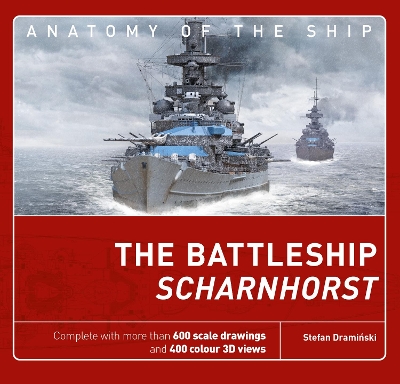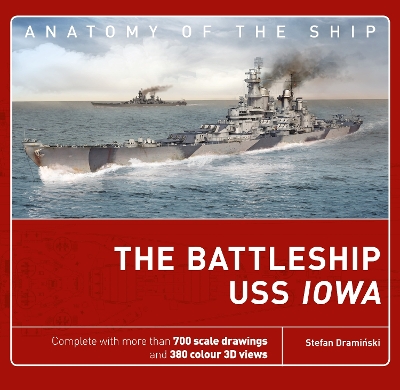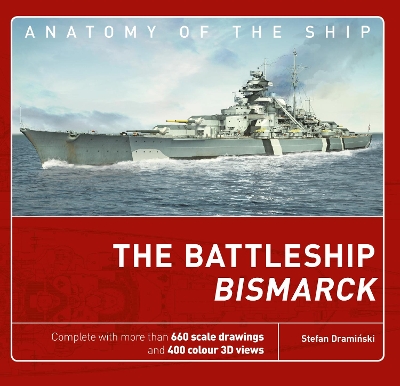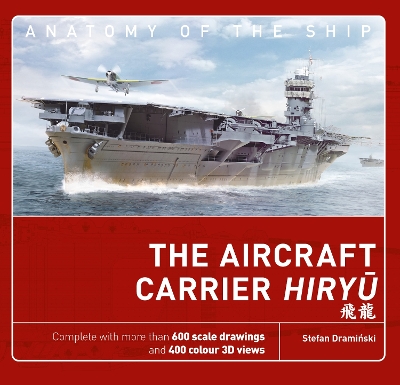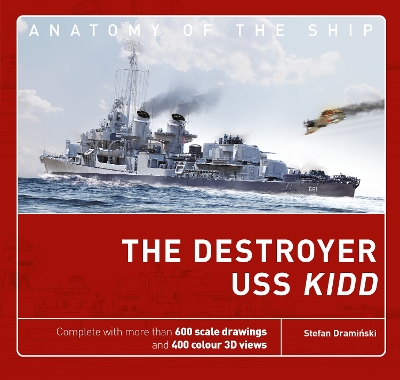Anatomy of The Ship
6 total works
The Kriegsmarine's Scharnhorst was a German capital ship, described either as a battleship or battlecruiser, and the lead ship of her class, which included one other ship, Gneisenau. She was launched on 3 October 1936 and completed in January 1939, armed with nine 28cm C/34 guns in three triple turrets. She operated with Gneisenau for much of the early portion of World War II, including sorties into the Atlantic to raid British merchant shipping. They took part in Operation Weserubung (April-June 1940), the German invasion of Norway, during which they sank the aircraft carrier HMS Glorious and her escort destroyers Acasta and Ardent. Scharnhorst also sank HMS Rawalpindi in November 1939. In early 1943, Scharnhorst joined the Tirpitz in Norway to intercept Allied convoys to the Soviet Union. On a sortie from Norway to attack a convoy, the German force was intercepted by British ships and during the Battle of the North Cape (26 December 1943), HMS Duke of York and her escorts sank Scharnhorst. Most of her crew was lost.
This is the most comprehensive examination of Scharnhorst ever published, drawing on new research and technology to tell the full story of the ship. It includes a complete set of detailed line drawings with fully descriptive keys and full-colour 3D artwork, supported by technical details, photographs, and text on the building of the ship, as well as a record of her service history.
This is the most comprehensive examination of Scharnhorst ever published, drawing on new research and technology to tell the full story of the ship. It includes a complete set of detailed line drawings with fully descriptive keys and full-colour 3D artwork, supported by technical details, photographs, and text on the building of the ship, as well as a record of her service history.
USS Iowa (BB-61) was the lead ship in one of the most famous classes of battleships ever commissioned into the US Navy. Transferred to the Pacific Fleet in 1944, the Iowa first fired her guns in anger in the Marshall Islands campaign, and sunk her first enemy ship, the Katori. The Iowa went on to serve across a number of pivotal Pacific War campaigns, including at the battles of the Philippine Sea and Leyte Gulf. The ship ended the war spending several months bombarding the Japanese Home Islands before the surrender in August 1945.
After taking part in the Korea War, the Iowa was decommissioned in 1958, before being briefly reactivated in the 1980s as part of President Reagan's 600-Ship Navy Plan. After being decommissioned a second and final time in 1990, the Iowa is now a museum ship in Los Angeles.
This new addition to the Anatomy of the Ship series is illustrated with contemporary photographs, scaled plans of the ship and hundreds of superb 3D illustrations which bring every detail of this historic battleship to life.
After taking part in the Korea War, the Iowa was decommissioned in 1958, before being briefly reactivated in the 1980s as part of President Reagan's 600-Ship Navy Plan. After being decommissioned a second and final time in 1990, the Iowa is now a museum ship in Los Angeles.
This new addition to the Anatomy of the Ship series is illustrated with contemporary photographs, scaled plans of the ship and hundreds of superb 3D illustrations which bring every detail of this historic battleship to life.
The Bismarck is perhaps the most famous – and notorious – warship ever built. Completed in 1941, the 45,000-ton German battleship sank HMS Hood, the pride of the British Navy, during one of the most sensational encounters in naval history. Following the sinking, Bismarck was chased around the North Atlantic by many units of the Royal Navy. She was finally dispatched with gunfire and torpedoes on 27 May, less than five months after her completion. Her wreck still lies where she sank, 4,800m down and 960km off the west coast of France.
Drawing on new research and technology, this edition is the most comprehensive examination of Bismarck ever published. It includes a complete set of detailed line drawings with fully descriptive keys and full-colour 3D artwork, supported by technical details, photographs and text on the building of the ship and a record of the ship’s service history.
Drawing on new research and technology, this edition is the most comprehensive examination of Bismarck ever published. It includes a complete set of detailed line drawings with fully descriptive keys and full-colour 3D artwork, supported by technical details, photographs and text on the building of the ship and a record of the ship’s service history.
